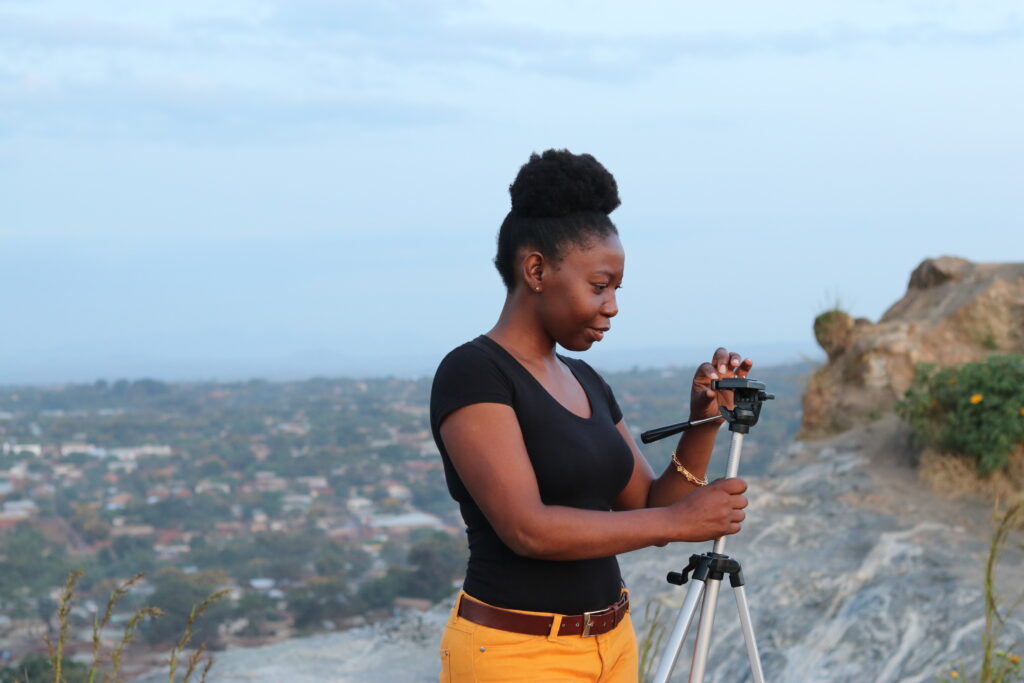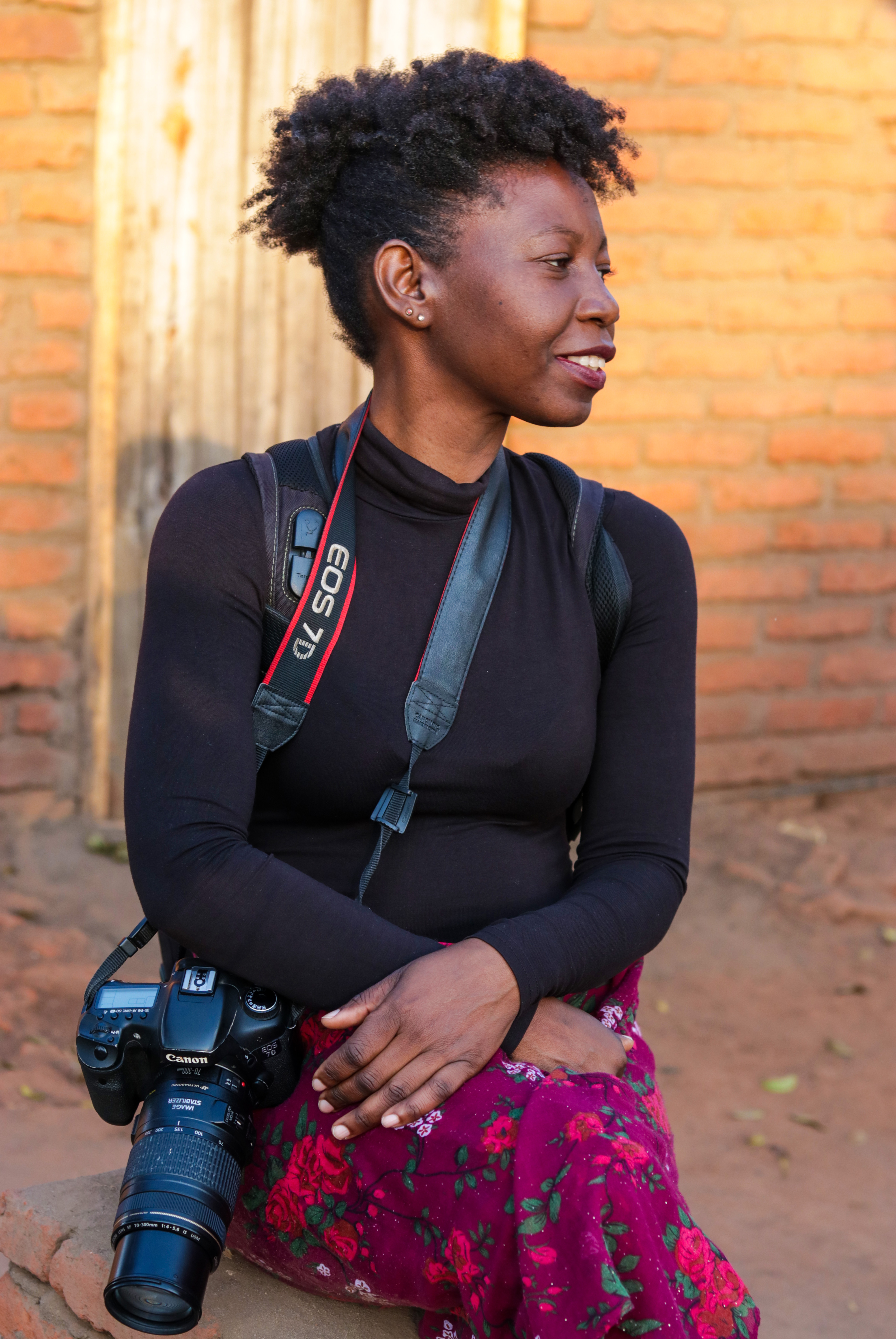Growing up in Harare, Angela Jimu would wake up early some mornings and lay magazines all over her bed. She had no idea what she was looking for; she would just gaze at the photos, or flip through the pages.
The “Canonite” working for change – and a wider role for women – in Africa’s photographic industry

Photos fascinated Angela Jimu as a little girl. Now in her forties, Jimu is today the co-founder of an association that empowers women in the photographic industry. That’s not all; her father’s home country is also getting her attention.
Regina Rumbidzai Pasipanodya, bird story agency
Growing up in Harare, Angela Jimu would wake up early some mornings and lay magazines all over her bed. She had no idea what she was looking for; she would just gaze at the photos, or flip through the pages.
Jimu was raised in Mufakose, one of Harare’s highest-density and oldest suburbs. Often, she would stay indoors and use the magazines to escape from her surroundings.
“I just loved the magazine photos,” she said.
As she grew older, she began to understand more about the profession behind the pictures. However, she was discouraged from ever thinking of photography as a career after being told that media was not a well-paying industry. So instead she pursued a career in public relations. Yet that same feeling that she had had as a child came back to nag at her. She felt she was missing something. It was time for a change.
“I didn’t know what I was looking for, but now I took to heart what George Elliot said: ‘It’s never too late to become what you might have been,” she said, launching into a description of her photography journey.

The pivot came when, at around 30, she grew fond of the Canon DSLR cameras. Soon, she was hooked on making images and so began a whole new chapter of her life. 13 years later, Jimu calls herself a ‘Canonite’, the name she gave herself to describe her love of Canon cameras.
“I normally move around with my 80D Canon and I am in love with the 50mm lens because of its depth of field,” said Jimu who is now a renowned visual storyteller, trainer, mentor, and coach for young photographers.
She studied photojournalism and documentary photography at the Market Photo Workshop in South Africa in 2010 and graduated with a Master of Arts in Media Management degree from the University of Westminster in 2015.
“So I guess that was my destined path because when a friend told me about the Market Photo Workshop in South Africa, I was awed and sold. I knew that I had to take up photojournalism. Visuals have so much power to communicate and words can just be supplementary. So I wanted that freedom of supplementing my words with images,” Jimu explained.
Excited at what her new journey had delivered and the opportunity to put her learning into practice, she hit a roadblock.
“After studying Photojournalism and Documentary Photography in SA, I went back to Zim, excited to be practising. It was so disconcerting for me to find the field male-dominated. I felt small and I needed a support structure.”
Bewildered at first, it didn’t take her long to find a solution.
“While I was photographing an event, I bumped into Davina Jogi who also studied at the Market Photo Workshop and had just returned to Zimbabwe. We roped in others, including Annie Mpalume who had also been practising… that is how ZAFP was born,” Jimu said.
The quartet established the Zimbabwe Association of Female Photographers (ZAFP) in 2011. They officially launched the initiative in 2013 with an exhibition entitled “Shutter Opener” which was held in Harare.
The ZAFP offers support, structure, opportunities, career advice, celebrating each other, and being there for its members. According to a document available on the homepage of their website, they offer 3 yearly membership fee options: students can access association benefits at US$15, amateur photographers at US$30 and professional photographers at US$50.
“We have 17 active members. Others are dormant, so we don’t count them,” Jimu disclosed.

Davina Jogi, co-founder and co-director of ZAFP noted that the association is a tool to encourage professionalism in the media profession as a whole. The association has introduced a female mentorship programme for younger photojournalists to further instil the ethics of photojournalism.
“ZAFP impacted my career in two ways; one is my confidence that having people who are facing similar challenges and doing similar work because we managed to establish a platform to discuss our work contributed positively as I would spend more time with like-minded people who are doing similar work, and the second is the creation of opportunities for us as photojournalists. There were quite a lot of opportunities for us which contributed towards our visibility as a group as we could get gigs and other work,” Jogi added.
Over the last 3 years, Jimu, Jogi and the rest of their team introduced the Annie Mpalume mentorship programme in celebration of Annie Mpalume, one of Zimbabwe’s most prolific photojournalists and a member of ZAFP.
Kudakwashe Ema Zihonye, 24, recently joined ZAFP and is studying Journalism, Media Studies, and Broadcasting at university.
“I always refer to Jimu’s pictures as I admire her eye and touch for photography, I just want to learn that kind of skill,” she said.
“ZAFP is a great initiative for women in photography which can refine their skills and also create opportunities for them in a male-dominated industry,” Zihonye added.
National Association of Freelance Journalists (NAFJ) Secretary General, Eddie Makuzva, noted the challenge Jimu has taken up with other photojournalists is to create a space for women.
“It will leave a mark in the Zimbabwe media landscape where women are regarded as followers,” Makuzva said.
“She did something great and in Zimbabwe, as Jimu was part of NAFJ, we are seeing more women working hard to take up leadership positions in newsrooms. This should not end here as their work is no less than that of their male counterparts,” he added.
After building a foundation for her new life journey in Zimbabwe, Jimu decided to stretch her expertise and talent into a neighbouring country. She moved to Malawi in 2019.
“I moved to Malawi because I wanted to embrace my Malawian roots as my father was Malawian. I love Malawi as it has opportunities, and the people are warm and friendly. It is my home. Zimbabwe is also my home, as my mother and most of my family are there and I still have strong interests there,” she explained.
Jimu credits 2023 as her best year ever, after she was selected as the Africa jury chair for the World Press Photo contest and as a jury member for several contests, including the Canon Female Photojournalist contest, the Ian Parry Photojournalism Grant, and Eugene Smith Student grant and a mentor for the Canon Student Development Programme.
“I see my career taking a new trajectory as I am transitioning into more mentoring roles. I believe that the world’s changing and one must change with it. One has to be versatile and multi-skilled,” she said, in her role as a senior photojournalist.
However, she has had her share of highs and lows, especially as a female journalist in a volatile Zimbabwe media industry. Despite living and primarily working in Malawi, Jimu sometimes gets apprehensive about photographic assignments, “given my experiences of being brutally assaulted and detained by the police while doing my job in Zimbabwe. The experience traumatized me. I have to remind myself that I am in Malawi and that thought makes me relax.”
“But since I live in Malawi now a country that is more accommodative, in 5-10 years, I will make sure I contribute towards the establishment of the ‘Centre for Visual Storytelling’ in Lilongwe. It will be a centre that promotes dialogue, learning, and social change through visual literacy and visual storytelling,” she said.
Jimu’s camera is always in her hand and Malawi has always been the place that manages to put a smile on her face.
“The best experience was when I was mobbed by a group of children, shouting and what was common in whatever they were saying was the word,’ “Ndijambuleni,” and I knew what they meant. They were asking me to take photographs of them,” she said.
One of the things that intrigued Jimu when she first moved to Malawi, was the use of the mbaula (charcoal cooker) in the cities.
“I just could not fathom why people in the city had to use charcoal and yet they had access to electricity. I started doing some research and learnt, at the time that only 11% of the country was connected to the grid and about 65% of those in cities used charcoal because for them it was cheaper than using electricity,” Jimu said.
She roped in two people and produced a documentary about the “charcoal economy.”
“It is a big industry with charcoal vendors, charcoal stove manufacturers, and everything in between. Coming from Zimbabwe, I was fascinated by the intricacies of the charcoal economy,” she added.
As New Year’s resolutions start to get ticked off lists, Jimu has decided that 2024 will be the year she takes each day at a time, with a few concrete plans already in motion.
“There is always something different each day. So far this year, I have been working online, making preparations for the mentorship programme that we are starting soon at ZAFP,” she concluded.




